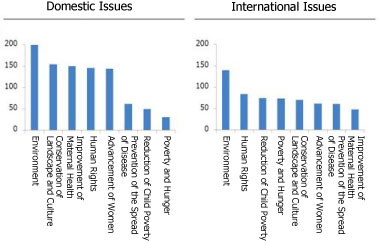August 27, 2014
Survey Provides Update on Corporate Social Responsibility Activities of Japanese Companies
Keywords: CSR Manufacturing industry Non-manufacturing industry

Image by Yahho.
A research team with the Corporate Social Responsibility (CSR) Study Project established by the Tokyo Foundation, a non-profit independent private think tank in Japan, conducted a survey to gauge the status of enterprises' CSR activities in Japan in 2013. The survey focused on the relationship between social issues that Japan and the world are facing and the CSR activities of enterprises, and covered about 2,000 companies, including those listed in the first section of the Tokyo Stock Exchange, major unlisted companies, and major foreign companies operating in Japan. The following is a summary of an analysis of the CSR activities by Japanese businesses, plus current situations and challenges, based on the survey results. We have prepared this with permission from the Tokyo Foundation.
-------------------------
Chart 1 shows the results of the responses from the companies to the survey question, "What kind of social issues are you addressing in your CSR activities?"

Chart 1: CSR Activities Categorized by Issue
Source: Tokyo Foundation from CSR Industry Survey (n = 218)
Copyright Tokyo Foundation All Rights Reserved.
First, we can see that most of the companies are practicing some type of approach under the environment category. Their challenges include prevention of environmental contamination, conservation of biodiversity, and adaptation to climate change. Japanese companies are recognized for having made progress in environmental conservation, and the survey results back this view.
Next, about 70 percent of all companies surveyed are practicing CSR activities corresponding to the following four categories: Conservation of Landscape and Culture, Improvement of Maternal Health, Human Rights, and Advancement of Women. In the first category, providing support to local events came in at the top, and in the category of Supporting Female Workers during Maternity and Improving Maternal Health, improvement of the leave system for pregnant women and adopting a health-check system for pregnant workers were listed. In the Human Rights category, companies mentioned the hosting of workshops on human rights, and in the Advancement of Women category, some listed activities such as the promotion of women in administrative positions.
Actions against diseases, child poverty, and poverty, however, are still inadequate. Let's look at diseases. According to the cause of death by age in Japan, malignant neoplasm (cancer), cardiovascular diseases, and cerebrovascular diseases are major causes for the total population, while accident and suicide are also main causes for young people and those under fifty, respectively. It's not only prevention and eradication of diseases but also reductions of accidents and suicides that are urgent social problems to be addressed. CSR activities to deal with such problems by Japanese businesses, however, remain at a low level.
Let's look at child poverty and poverty in general. Since Japan's poverty rate is relatively higher than in other major developed countries and is growing, there is a need to focus more on poverty as a social problem, but Japanese businesses still haven't done much about the problem.

Image by Panos Photographia Some Rights Reserved.
Among Japan's CSR activities overseas, environmental preservation-related efforts are predominant, but the number of CSR activities in other fields is still small. In spite of the advancement of globalization of Japanese corporations, few deal with or are accountable for problems such as human rights and women's social advancement within their companies and their branch offices around the world. The survey found that even its respondents -- most of which are listed companies in the first section of the Tokyo Stock Exchange, and CSR leaders with a dedicated CSR division -- still have a long way to go to tackle such problems overseas.
JFS will continue to report on Japanese CSR trends.
Source: Website of The Tokyo Foundation: Businesses can change a society -- CSR aiming for integration (1) Integration of social problems and corporate management (in Japanese)


